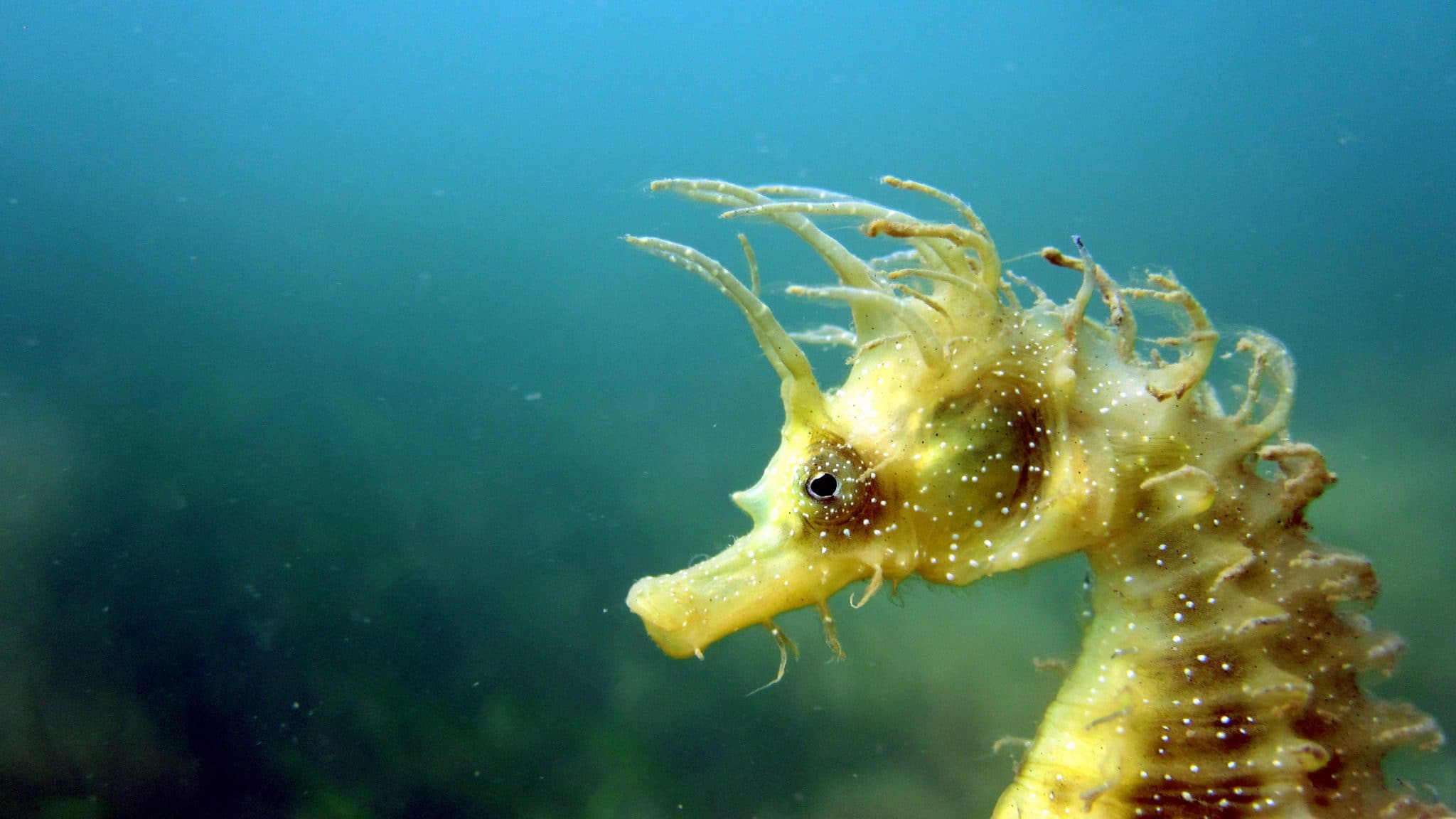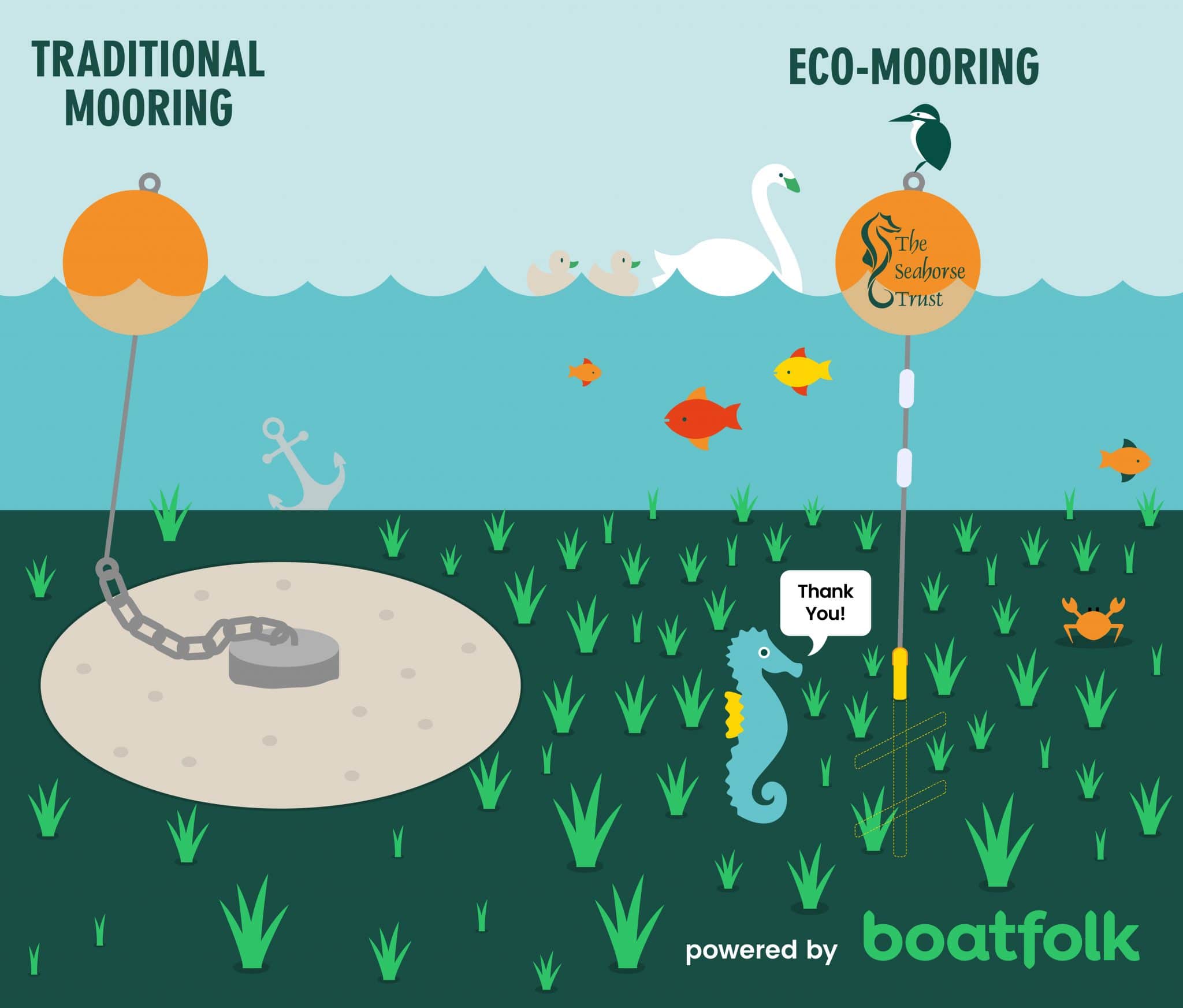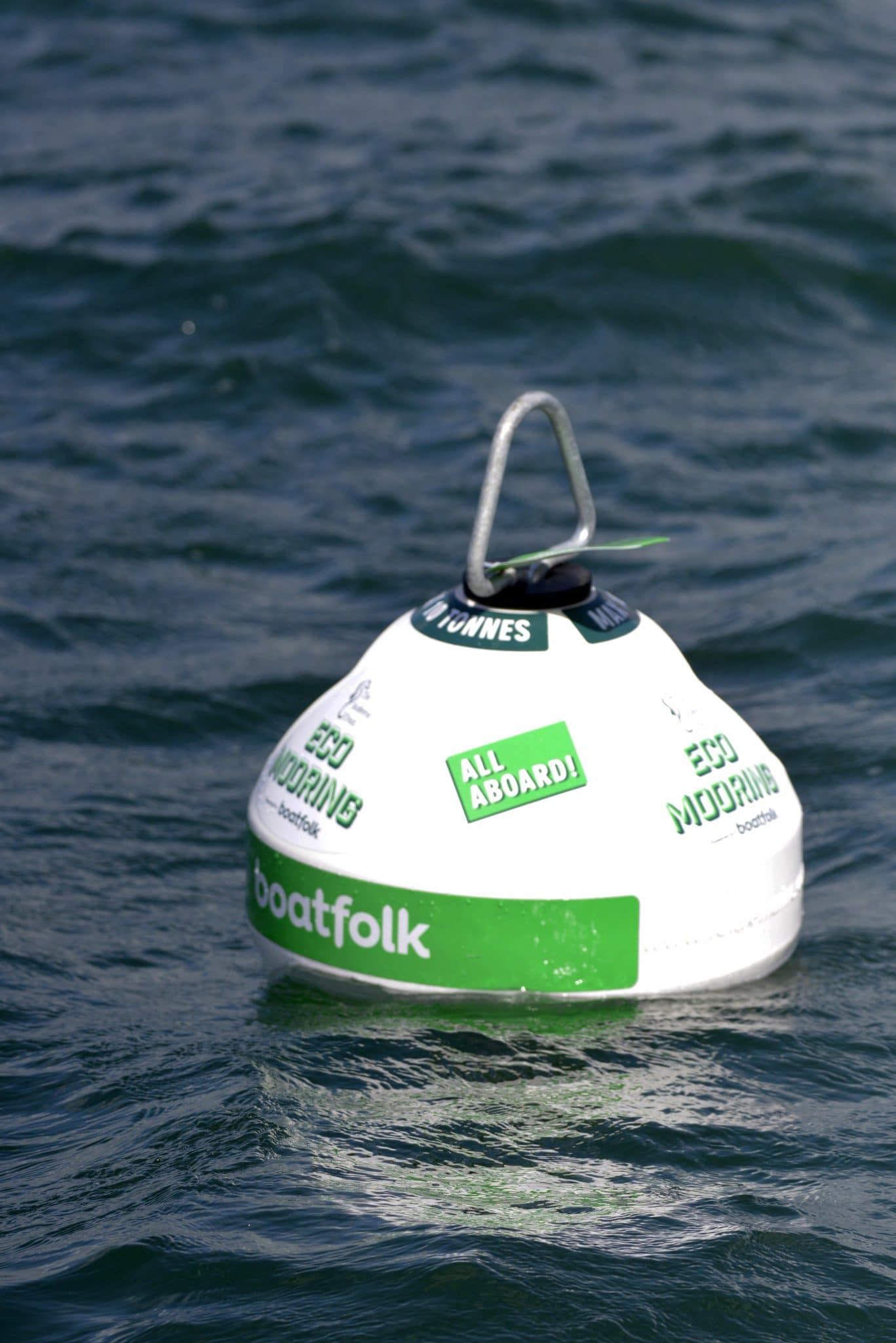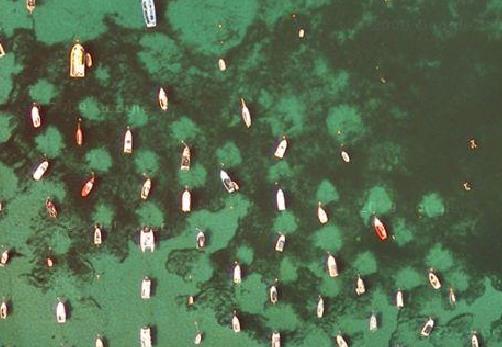Marine Life & Conservation
Boating and conservation worlds unite to save Studland’s seagrass and seahorses

Charity The Seahorse Trust and national marina group boatfolk have joined forces to deliver a practical solution for saving Studland’s unique marine environment.
The two organisations have collaborated on a not-for-profit scheme to put ten ‘eco-moorings’ into Studland Bay to give boaters an attractive, environmentally friendly alternative to dropping their anchors. The dropping of anchors has damaging consequences for seabed environments including seagrass meadows. This is a significant concern as seagrass provides essential habitat for species including seahorses and also stores up to twice as much carbon per hectare as terrestrial forests, playing a major role in keeping climate change in check.
The scheme was recently approved by the Marine Management Organisation (MMO) following its designation in 2019 as a Marine Conservation Zone (MCZ) and installation of the new eco-moorings is now underway. The organisations’ eco-mooring proposal was supported by letters from high-profile conservation advocates including Chris Packham and Steve Backshall. The scheme is also being supported by Mitch Tonks and Rockfish who will provide funding for the installation of one of the eco-moorings.
The MCZ designation was made on the basis of Studland Bay’s seagrass meadows, which are an internationally important breeding ground for the Spiny Seahorse, one of Britain’s native seahorse species. The Spiny Seahorse was protected in 2008 under the Wildlife and Countryside Act following campaigning by the Seahorse Trust. The legal aim of the MCZ designation was to return both seagrass and seahorses to ‘favourable condition’.
Neil Garrick-Maidment, Founder and Executive Director of The Seahorse Trust said: “The designation of Studland Bay as a Marine Conservation Zone was a long-awaited and hugely significant moment in safeguarding UK seahorse populations. It is now vital that the area is effectively protected and that everyone who uses the bay does so responsibly and sustainably. I am delighted to be working with boatfolk to develop a practical solution, which allows boaters to continue enjoying this remarkable site, in a way which also enables the conservation of rare seagrass meadows and crucial seahorse breeding grounds.”
Michael Prideaux, Managing Director of boatfolk said: “In late August, I met Neil on the beach at Studland Bay. We were united by our shared passion for the environment and by a desire to work with, and alongside, the boating community for a solution that everyone can get behind. boatfolk is all about making it easy for people to get out on the water and to enjoy their time afloat. Providing an alternative option at Studland that protects this incredible marine environment is about doing the right thing for boaters and for our planet. Financial return is not an objective here; we are committed to making Studland Bay a sustainable boating destination for generations to come and are proud to be putting our name and resources behind the scheme.”
The scheme forms part of boatfolk’s wider sustainability strategy, Coastline Deadline, a new platform designed to back projects which have a real, positive and measurable impact on the coastline.
Michael Prideaux adds, “We know our industry has an impact on the environment and that not enough is being done to raise awareness and change behaviours. Our goal isn’t to stop people boating. In fact, it’s the opposite. By making changes now we want to ensure that the coastline and oceans remain a place that can be enjoyed for generations to come.”
The benefits of eco-moorings are well-documented. Such moorings involve a helical screw anchor being driven into the seabed. An elastic rode is then attached, connecting the anchor system with the mooring buoy. The elastic rode will stretch at higher tides and contract at lower tides meaning that none of the equipment scours the seagrass around it. The moorings also provide a hassle-free option for boaters, saving them the trouble of having to drop their own anchors (which can often drag before taking a hold and leave the boat owner to clean the equipment afterwards).
Neil Garrick-Maidment and Michael Prideaux commented: “The Seahorse Trust and boatfolk are united in a clear belief that eco-moorings are the way forward for Studland, allowing boaters to continue enjoying the site while seagrass and seahorses thrive alongside. We were thrilled to secure MMO approval for our proposal, which we believe provides a practical and collaborative roadmap to finally giving Studland Bay the effective protection it deserves, and are delighted that installation of the eco-moorings is now underway following successful tests of the helical screw.”
The Seahorse Trust and boatfolk are very grateful to award-winning Devon and Dorset restaurant group Rockfish for their generous sponsorship of one of the initial ten eco-moorings.
Mitch Tonks, restaurateur, Rockfish and Seahorse restaurants, and co-founder of the Devon Environment Foundation, expressed his support for the scheme: “We believe Rockfish has a purpose beyond our restaurants. This is exactly the sort of project we like to support – practical, visible and useful, as well as changing the way we impact our world. It’s this on-the-ground stuff we love that people like The Seahorse Trust go out there and do.”
For more information on the work of The Seahorse Trust visit their website by clicking here.
Header image: Neil Garrick-Maidment
Marine Life & Conservation
GROUNDTRUTH collaborates with PADI on pioneering submersible collection

GROUNDTRUTH, a story-led material innovation company that is fast forging a reputation for its next generation travel gear, is thrilled to announce its collaboration with the world’s largest diving association – PADI – on a range of pioneering submersible bags.
Entitled UNDA, Latin for wave, the collaborative range sets a new standard in sustainable design, with the GROUNDTRUTH team transforming the standard drybag into a future-focused travel companion, representing the two partners’ shared philosophy of ocean and environmental protection.
The 100% recycled bag range’s proprietary material is made from plastic waste including ghost fishing nets, post-consumer Nylon and plastic bottles. It is used alongside GROUNDTRUTH’S own patent-pending GT-OCO-CO2® hardware range, made from recycled plastic and captured CO2 emissions.
With a presence via 6,600 dive centres and resorts in 184 countries and territories throughout the world, PADI has amassed a hugely engaged community of 30 million+ divers to date. This collection creates a platform to highlight the shocking / mind blowing impact of plastics affecting our blue planet while actively contributing to its removal – empowering people from around the globe to take meaningful action to protect what they love.
“We are incredibly excited to partner with PADI on this project which will be launched via PADI’s global diving network and via our own channels,” said Georgia Scott, Co-founder and CEO of GROUNDTRUTH. “Ghost fishing nets account for over 50% of all plastic waste in our oceans, causing irreversible damage to global marine ecosystems. By combining our expertise in innovative design with PADI’s dedication to Ocean conservation, we aim to make a significant positive impact through the repurposing of these harmful plastics. GROUNDTRUTH was created with the value that all consumer products should contribute to a safer planet.”
“We are proud to collaborate with GROUNDTRUTH, as this partnership exemplifies our shared mission to mobilize the global community of Torchbearers who actively explore and protect our ocean,” said Lisa Nicklin, Vice President of Growth and Marketing for PADI Worldwide “Together, we’ve revolutionized the way that divers can carry around their essentials while elevating their commitment to protecting the place they love. It’s truly a product line designed by divers, for divers.
The UNDA range will be available for pre-order through www.groundtruth.global from the 3rd of February 2025 with PADI members being given the first opportunity to buy via their channels. Join us in this pioneering initiative to explore, protect, and preserve our oceans for future generations.
For more information about the GROUNDTRUTH x PADI collaboration, click here.
About GROUNDTRUTH®
GROUNDTRUTH sparks a new generation of travel gear that enables and accelerates positive change, making a transformative impact to industries, processes and people. As a green technology business and lifestyle brand, at the heart of GROUNDTRUTH is the exploration and development of new materials crafted from the world’s pollution and plastic waste. Their patent-pending GT-OCO-CO2® hardware range, created from recycled plastic and captured CO2 Emissions, is a world first.
Utilising their origins as investigative documentary filmmakers, sisters and founders Georgia, Sophia and Nina Scott, have hand-built GROUNDTRUTH’s unique Bluesign® certified supply chain ecosystem with partners who share the brand’s ethos for people and our planet. Their mission and products are created to support and empower individuals who are making a difference, both in their communities and around the world.
About PADI®
PADI® (Professional Association of Diving Instructors®) is the largest purpose-driven diving organization with a global network of 6,600 dive centers and resorts, 128,000 professional members and more than 29 million certified divers to date. Committed to our blue planet, PADI makes the wonder of the underwater world accessible to all, empowering people around the world to experience, explore and take meaningful action, as Ocean TorchbearersTM, to protect the world beneath the surface. For over 50 years, PADI is undeniably The Way the World Learns to Dive®, setting the standard for the highest quality dive training, underwater safety and conservation initiatives while evolving the sport of diving into a passionate lifestyle. For divers by divers, PADI is obsessed with transforming lives and, with its global foundation, PADI AWARETM, creating positive ocean change. Seek Adventure. Save the Ocean.SM
Marine Life & Conservation
Go Diving Show 2025 UK Stage Speaker: Lloyd Rees-Jones

Sharks dwell off the UK coastline, but did you know there is one that glows in the dark? Join Lloyd Rees-Jones at this year’s GO Diving Show in March when he takes to the UK Stage to showcase a very different side of our marine life when viewed in a different light (no pun intended!).
Lloyd Rees-Jones is a HSE Part 4 Media Diver, PADI Master Scuba Diver Trainer, underwater videographer and seasoned volunteer with Neptunes Army of Rubbish Cleaners (NARC). For almost 20 years he has been completely captivated by three shore diving locations in Pembrokeshire, West Wales, and every year he discovers something new that fills him with excitement for the season ahead and keeps him going back year after year.
Ultraviolet night diving in Pembrokeshire
Lloyd’s talk on the UK Stage will be about marine fluorescence and the nocturnal activities of our favourite coastal species, and will give a glimpse on how ultraviolet night diving has the potential to rekindle our passion for night diving – and also the hidden benefits it can bring to our UK diving adventures.
Go Diving Show 2025 takes place at the NAEC Stoneleigh Park, Coventry, on the 1st -2nd March.
-

 Gear Reviews2 months ago
Gear Reviews2 months agoGear Review: SurfEars 4
-

 Marine Life & Conservation3 months ago
Marine Life & Conservation3 months agoPaul Watson Released as Denmark Blocks Japan’s Extradition Bid
-

 News1 week ago
News1 week agoHumpback Mother and Calf Win Underwater Photographer of the Year 2025
-

 News2 weeks ago
News2 weeks agoGo Diving Show 2025 Exhibitor Showcase
-

 News2 months ago
News2 months ago2-for-1 tickets now available for GO Diving Show
-

 Blogs3 months ago
Blogs3 months agoJeff Goodman Launches Underwater Moviemaker Course with NovoScuba
-

 News3 months ago
News3 months agoDive into Adventure: Limited Space Available for January Socorro Liveaboard Trip with Oyster Diving
-

 News3 weeks ago
News3 weeks agoFilming 360 in The Bahamas


















